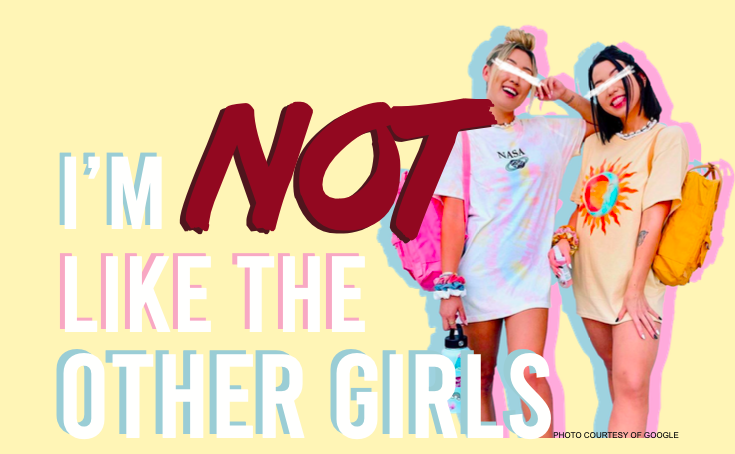“I’m Not Like the Other Girls”
October 12, 2020
Internalized misogyny envelops our daily lives nearly as much as toxic masculinity, yet society has taken even fewer steps towards addressing it. Internalized misogyny is a loose term that describes how women forever scramble to be accepted in society from their looks to their behaviors. The more desperate a woman is to follow the ever-shifting, contradictory rules, the easier she is to control and exploit. The “I’m Not Like Other Girls” phenomenon is a toxic mentality that women adopt when they claim they are different from other girls. Through this, they shame other women for behaving in a certain manner, whether they are conscious of it or not. This reinforces negative stereotypes and pits women against each other. Women who say things like “I’m not other girls; I’m quirky” put themselves on a pedestal in order to be favored by men and are often referred to as pick-me girls.
Chances are that you have encountered a pick-me girl at one point in your life. They might have said to you: “I do not wear makeup like other girls” or “Gosh, I eat so much for a girl.” These seemingly harmless phrases shame other women. By calling themselves different for not participating or acting in a certain activity, these women label that activity as undesirable or “too normal”. Negative stereotypes about women abound. When women distance themselves from other women with phrases like these, they send a message that there is something wrong with being or acting a certain manner. Pick-me girls are superior for doing or not participating in that certain thing. They might say I play video games unlike other girls, or I don’t wear makeup like other girls, which insinuates that other girls are undesirable or inferior to them for wearing makeup.
However, the toxicity does not end there. Girls who adopt the “I’m Not Like Other Girls” mentality also shame women who dress or act mainstream. This can take the form of calling girls who shop at Brandy Melville basic or ordinary, or implying that how they dress or act is superior to those girls. In addition, by not acting a certain way, quirky girls distance themselves from other girls. Their aim may be to contradict common stereotypes, but they end up perpetuating them and shaming women in the process.
This mentality is also perpetuated by social media. Media already shames young girls for not behaving in certain ways. When they see other women be put down for certain behaviors, they can grow to believe that shaming other women is normal. They adopt the mentality that if they are different, they will be noticed and chosen over other girls. The most recent version of this mentality has surfaced as the conflict between basic girls and bruh girls. Both are opposites and it was trendy to be a bruh girl. This trend divided women on social media as both sides shamed the other and considered themselves superior. However, both sides were pick-me girls as each shamed one another. The mentality describes any woman who claims they are better and shame other women simply because they behave in a certain way. It can be adopted by any woman or person, not just so-called basic girls. The “I’m Not Like Other Girls” mentality does nothing but encourage women to shame those that they should embrace




